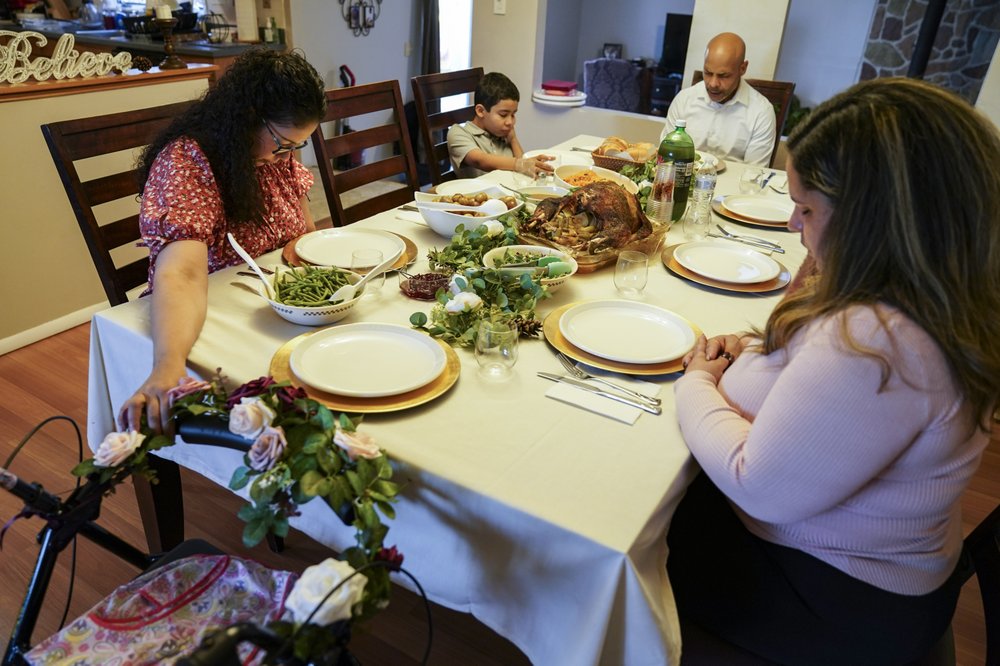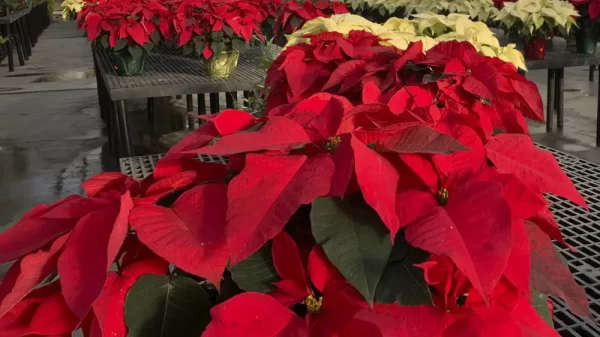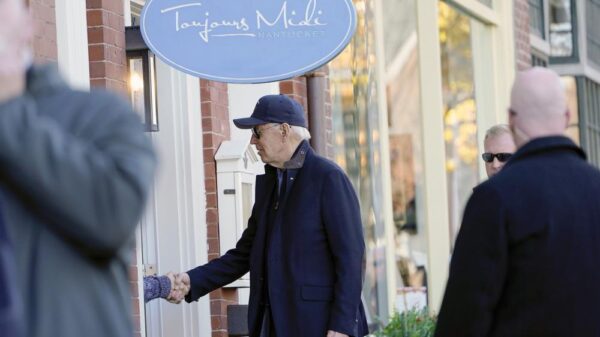Vivian Zayas holds onto the walker once belonging to her recently deceased mother Ana Martinez while her family prays before Thanksgiving dinner, Thursday, Nov. 26, 2020, in Deer Park, N.Y. Ana Martinez died at 78 on April 1 while recovering at a nursing home from a knee replacement. (AP Photo/John Minchillo)
Vivian Zayas can’t keep herself from scrolling through photos of last Thanksgiving, when her mother stood at the stove to make a big pot of rice and beans and then took a seat at the edge of the table.
That was before anyone had heard of COVID-19 and before it claimed the retired seamstress. Ana Martinez died at 78 on April 1 while recovering at a nursing home from a knee replacement.
The family is having their traditional meal of turkey, yams, green beans and rice and beans — but Zayas is removing a seat from the table at her home in Deer Park, New York, and putting her mother’s walker in its place.
“It’s a painful Thanksgiving. You don’t even know, should you celebrate?” asked Zayas. “It’s a lonely time.”
The family is left with “an empty chair at the table forever,” another daughter, Alexa Rivera, said Thursday.

Americans are marking the Thanksgiving holiday amid an unrelenting pandemic that has claimed the lives of more than a quarter of a million people in the United States.
Turkey and pies will still come out of ovens, football will still be on TV, families will still give thanks and have lively conversations about politics. But this holiday has been utterly altered after months filled with sorrows and hardships: Many feasts are weighed down by the loss of loved ones; others have been canceled or scaled back with the virus surging.
Zoom and FaceTime calls have become a fixture at dinner tables to connect with family members who don’t want to travel. Far fewer volunteers are helping at soup kitchens or community centers. A Utah health department has been delivering boxes of food to residents who are infected with the virus and can’t go to the store. A New York nursing home is offering drive-up visits for families of residents struggling with celebrating the holiday alone.

“The holidays make it a little harder,” said Harriet Krakowsky, an 85-year-old resident of the Hebrew Home at Riverdale in New York who misses the big Thanksgiving celebrations of years past and has lost neighbors and friends to the virus. “I cry, but I get over it. We have to go on.”
On any normal Thanksgiving Day, Kara McKlemurry and her husband would drive from their Clearwater, Florida, home to one of two places: his family’s home in another part of the state or her family’s house in Alabama. This year, McKlemurry informed her family there would be no visits. When her in-laws offered to stop by, the couple said no.
She and her husband didn’t want to risk infecting anyone or getting the virus themselves.
Not everyone followed McKlemurry’s example. Millions of Americans bought tickets to fly somewhere for the holiday, crowding airports despite pleas from officials to avoid travel and gatherings.
Still, McKlemurry, 27, wanted to do something unique to mark this unusual holiday — something to let everyone know that she and her husband still feel blessed this year.
So, a week before Thanksgiving, armed with colored pens and stickers of owls with scarves, she hand wrote notes of gratitude to every member of the family.
Copyright 2020 Associated Press. All rights reserved.










































